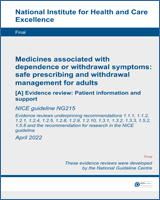| Information needs |
|---|
| Information on the need for medication22,
120,
278 | Peoples’ perceptions of their need for medication to maintain a normal life appeared to influence their treatment initiation as well as their potential discontinuation at a later stage, with some viewing antidepressants as essential, but most experiencing great uncertainty. |
| Information about what to expect from the medicine 22,
21,
152,
278,
328,
452 | The absence or provision of insufficient info on their condition and medication from their doctor before treatment initiation or changes to medication, caused reluctance to start medication, dissatisfaction with prescribed medicines due to discrepancies between their expectations of them and reality and often implicated their relationship with their doctor. |
| Side-effects & long-term adverse effects22,
120,
152,
278,
287,
328,
456 | People were worried about the potential side-effects, the dangers of being on antidepressants long-term while experiencing unexpected adverse effects amplified their dissatisfaction with health-professionals or even led to discontinuation or withdrawal; pharmacists reflected on the importance of being aware that side-effects commonly occur before therapeutic effects, while people reflected on how early awareness could facilitate coping. |
| Expected length of treatment at the start21,
120,
278 | People beginning to take antidepressants had concerns over the length of their treatment which often remained unaddressed, while being aware of the limited duration and temporary nature of antidepressants from the beginning of prescribing appeared to facilitate tapering. |
| Time lag between treatment initiation and benefits 21,
152,
452 | People are often unsure about how long it takes for antidepressants to take effect considering raising their own dosage, experimenting with benzodiazepines or other alternatives when experiencing disappointment in the effects of their medicine. While pharmacists reported that information on that during the first weeks is important as it can be difficult to persevere as expected positive outcomes are often preceded by side-effects. |
| The benefits and positive aspects of medicine152,
328 | As people can be reluctant towards starting their medication due to concerns over potential side-effects or social stigma associated with the medicine, pharmacists consider it important to provide information on the benefits of treatment in the beginning, focusing on the positive aspects rather than the long-term negative aspects people may experience, while patients wish to be informed both about the benefits as well as the risks. |
| The consequences of stopping 120,
229,
452 | People taking antidepressants wish to be informed about the potential consequences of stopping the medicine, as fears surrounding potential consequences and the possibility of relapse were often a barrier to discontinuation. |
| Internet resources 21,
328 | The internet facilitated peoples’ access to information about their prescribed medicine and was often used to complement the information received by health-professionals, although some were concerned over the reliability of the information available online or preferred face-to-face communication, books or telephone services. |
| Patient accounts and peer support 21,
328,
452 | Reading about the experiences of others with drugs via internet forums, although potentially misleading, helped people better understand their own experience, while sharing one’s own experiences with peers via the internet could be source of support |
| Information and support through medical consultations 21,
328,
452 | Physicians were viewed by people taking antidepressants as the primary source of information and support and being given sufficient information during medical consultations was key for establishing a relationship with their health professional and in decision-making about taking antidepressants. |
| Patient information leaflets 152,
278,
328 | Patient information leaflets, despite sometimes being viewed as insufficient or discouraging, can be a useful education tool for various stages of treatment both for people taking antidepressants and pharmacists supporting them and can overcome the barrier to information imposed by the limited consultation duration. |
| Different means of communication 328 | Telephone services and email are mediums people are willing to use to get the information on antidepressants that they require, despite health professionals potentially being poorly equipped to respond to questions in this manner. |
| Type of information 328 | People taking antidepressants valued access to information that is the most up-to-date, comprehensive and evidence based. |
| Support needs |
|---|
| Health professional support with adherence & self-monitoring 152,
278 | People on antidepressant treatment often experienced adherence problems with pharmacists often undertaking the task of supporting them through the provision of advice and strategies to improve medication-taking behaviour, while support with self-monitoring from GPs was found helpful. |
| Support with tapering and discontinuation22,
120,
229,452 | People often wished to come off antidepressants but experienced difficulty doing so and a lack of information and guidance, while when that was given, it appeared to facilitate tapering. |
| Advocacy from health care professionals and mutual decision-making 22,
21,
287,
278 | Lack of acknowledgment of the patients’ concerns and experiences as well as their part in decision making by clinicians and the ease with which they often prescribed antidepressants caused great dissatisfaction, while validation from clinicians could facilitate doctor-patient discussions and coping with the difficulties they experienced. |
| Relationship with clinicians and continuity of care 278,
456 | Developing a relationship with their clinician early on and being seen by the same person on subsequent visits was valued by people taking antidepressants, although some experienced lack of treatment follow-ups and of doctor-patient communication at treatment renewals. |
